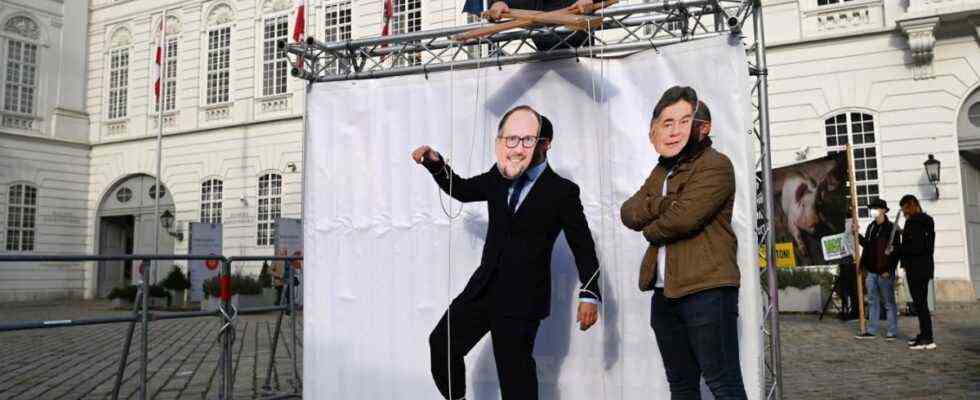A small sensation overshadowed the special session of the Austrian National Council on Tuesday, which was pushed through by the opposition parties. Actually, on Tuesday, a motion of no confidence was supposed to force the Chancellor to withdraw after the news of raids and an investigation by the Economic and Corruption Public Prosecutor’s Office (WKStA) for corruption of advertisements and fake bills against Kurz, his environment and the ÖVP belonging to the country last week had shaken. On the weekend there were also embarrassing chats from Kurz from his time as foreign minister.
But Kurz had already announced his resignation on Saturday because he could no longer hold himself politically. On Monday, his successor, the previous Foreign Minister Alexander Schallenberg, was sworn in by the Federal President – not without the latter apologizing to the citizens for the image that the ÖVP presented: “Let me say something about the moral image that we have have seen “, says Alexander Van der Bellen. “I don’t want to shrug off this disrespect.” As Federal President, he asked your pardon for “what image politics has given us”.
Then on Tuesday morning a proverbial bomb burst: The newspaper The standard reported that Sabine Beinschab, the pollster who is said to have carried out surveys for Kurz and his team in 2016 and 2017 and offset them with bogus bills via the ÖVP-led Ministry of Finance, had been temporarily arrested. She is one of a total of ten accused in the proceedings and is alleged, according to the accusation of the WKStA, to have prepared and presented opinion polls for the party in such a way that they served the political advancement of the foreign minister at the time. In 2017, after an internal party campaign against the then ÖVP boss Reinhold Mitterlehner, he himself became party leader and then chancellor in an ÖVP / FPÖ coalition.
The WKStA did not want to confirm the measure against the pollster Beinschab. Investigators heard that they apparently tried to destroy “server data on a large scale” before the house search last Wednesday. There is therefore a risk of blackout. Even the short intimate and ex-general secretary in the Ministry of Finance, Thomas Schmid, tried to delete his cell phone data in 2019, but they could be restored. During a search of the house of Finance Minister Gernot Blümel, who is being investigated for bribery and corruption in connection with a donation offer by the Novomatic gaming group to the ÖVP, Blümel’s wife went for a walk with her laptop and pram; the device was only secured after several hours.
The Chancellor throws a printout of the search warrant on the floor
And then there is the so-called shredder affair from May 2019: Shortly before the motion of no confidence that ended the first Kurz government, an employee of the Chancellery destroyed five hard drives, which are attributed to the Ministry of Finance under Blümel. Kurz dismissed shredding as a single action by an over-motivated employee.
So now the first arrest in the new investigation caused heated debates – not only in parliament. Because Beinschab must have been warned of the upcoming house search, as have some ÖVP politicians recently. And so it was a strange parliamentary session in more than one respect: While the news was being discussed heatedly, the new Chancellor made a government statement in which, as in a first statement after the swearing-in, he affirmed his closeness to Kurz. Even after the appointment with the Federal President, Schallenberg, a trained diplomat, had stressed without need that he considered the allegations against Kurz, against whom the judiciary was investigating for fraud and aiding in corruption, to be “false”.
Now the new Chancellor said he was holding out his hand to cooperate, but immediately criticized motions of no confidence by the FPÖ against the entire government and the SPÖ against Finance Minister Blümel. The SPÖ argues that Blümel is now “the top representative of the Kurz system in the government. And his ministry was also the scene of the alleged corruption.” Both motions did not get a majority. The fact that Schallenberg, as the newly sworn chancellor, told Parliament that he disapproved of its motions is considered unusual – and further evidence that the new, who had been a close colleague of Kurz, demonstratively stands in front of the ex-chancellor.
Kurz himself had been elected second club chairman alongside August Wöginger the evening before with one hundred percent of the votes cast. But it is said that he will be active in his role as party leader of the ÖVP and leave Wöginger to do the day-to-day work. Kurz will not appear in parliament until the next few days, when the parliamentary mandate he is claiming has been formally transferred to him. The special session on Tuesday took place without a short. But Schallenberg lived up to his predecessor: During the plenary debate, he hardly listened and kept tapping on his cell phone. A few seconds later he carelessly threw a printout of the search warrant of the WKStA, which Neos boss Beate Meinl-Reisinger gave him as a warning, on the floor behind him. He later apologized for it.
How is ex-Chancellor Kurz going on in the crisis? Register here for the free Austria newsletter.

